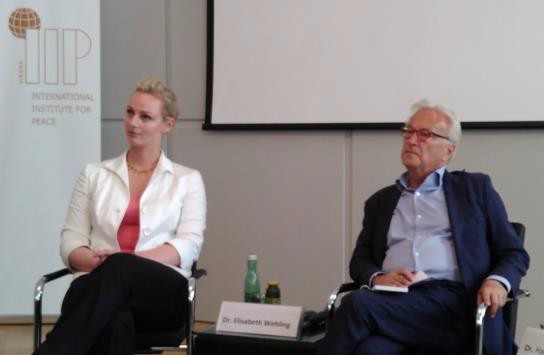Populism and political speech

Event data
- Datum
- 9. 6. 2016
- Host
- Presseclub Concordia
- Location
- Presseclub Concordia
In the crowded Concordia Press Club, former MEP Dr. Swoboda discusses the importance of language in politics with German communication psychologist Dr. Wehling and university professor Dr. Ötsch.
Hannes Swoboda explains that language is “nothing neutral”, but creates the framework and shapes prejudices, mindsets and attitudes. He therefore calls to increasingly question the terms used.
Elisabeth Wehling explains that there is no objective processing of facts but that subjective value systems are significant. The self-interest is only “a marginal decision factor”, “gut feeling” is much more important in the decision-making process.
The “people of the (political) mainstream” are often misunderstood as a “political vacuum”. Investigations (by various cultures like the US or China) have shown, that this section comprises approximately 35% of the population. There is no indication that this group is disappearing. These potential swing voters wander left or right, with the decision heavily influenced by what is referred to as “framing”. The term describes a conceptual framework of interpretation for terms. This can be well exemplified based on taxes, which are considered as negative per se. This is reflected in terms such as tax burden, tax evasion or tax haven.
The political framing whose meaning citizens are not usually aware of, activates one of two values.
The two values are the conservative and the progressive approach. The conservative psyche wants ” black and white rather than too much gray”, a “dogmatism of values” is therefore more likely to be found in the conservative than in the progressive camp. The conservative forces are consequently also more likely to want to spread their own values.
Currently relevant policy issues are characterized by conservative rather than progressive ideals.
Dr. Walter Ötsch analyzes the language of the FPÖ, which – like most right-wing parties – very effectively uses a pictorial language. In this “dual screen” there are the “good guys” (“us”) and the “evil”, which is also reflected in slogans and juxtapositions like home vs. Brussels, secure pension instead of asylum or, “daham vs. Islam”*. The FPÖ think “in conspiracy theories”, a deepening of this image considered to be “dangerous to democracy” by Ötsch. The language is characterized, inter alia, by, “container terms”, which are often invented and whose meaning is (therefore) unclear. A “homogeneous community of fate” is created. In addition, “fight relationships” in terms of “We must defend ourselves” are defined. The picture shows an exaggerated morality, property policy is sacrificed to the individual level.
*Past slogan, using a colloquial term for “home”- translator’s note
“The greatest tragedy is that the ÖVP do not notice!”, states Dr.Ötsch.
Dr.Ötsch links neoliberalism with right-wing populism and fears that as a result of insoluble economic problems, “democracy is being questioned and an authoritarian turn as a solution” could follow.
Wehling advises the (former) major parties, not to criticize the lack of program of populists, but rather to consider what the parties of the political mainstream stand for.
The instrument of “moral indignation” works well and is used by both sides equally. The cry against the “social hammock” on the one hand, the call to action against the “environment-poisoning industry” on the other side.
Wehling refers to the election campaign of Donald Trump, who did not use policy analysis’, but studied ultraconservative radio shows and moral ideals contained therein.
With Trump (and other populists), Ötsch sees the risk of de-legitimization of elites – and this “quick change” would be “worrying”.
Finally Wehling points out two key aspects, the communication of values and authenticity. A big part of the success of former US President Ronald Reagan, according to Wehling, can be attributed to his authenticity.
Above all, the lecture by Dr. Wehling very well illustrates the relevance of language and the particular importance – by means of the appropriate choice of words – of adressing the potential swing voters, in other words the so-called political middle, and to enthuse them for one’s own values. The presentation reinforces the relevance of emotions in comparison with facts and rational arguments several times, even when contrasted with self-interest, which only represents a marginal decision factor.
Dr. Ötsch openly presents himself as a fierce opponent of the FPÖ and criticizes their communication strategy vigorously.
Translation from German: Serena Nebo
Credits
| Image | Title | Author | License |
|---|---|---|---|
 |
Populismus und politische Sprache | Thomas Farthofer | CC BY-SA 4.0 |
